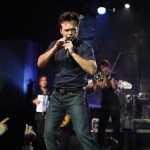Mellencamp at Crump Theater
This was a special show, a private show taped for the Biography Channel and A&E. The theater only held 600 people, and John was given the key to the city, of Columbus, Indiana in 2008.


This was a special show, a private show taped for the Biography Channel and A&E. The theater only held 600 people, and John was given the key to the city, of Columbus, Indiana in 2008.

